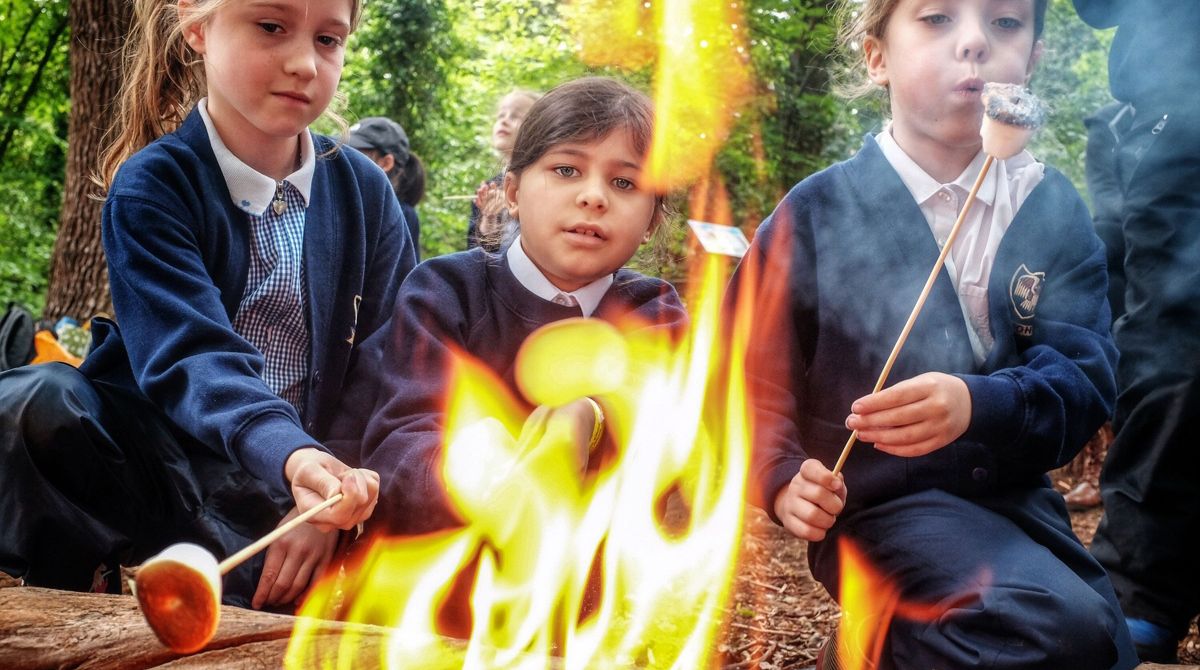Outdoor learning helps school pupils deal with anxiety, Kingston University teaching expert says
Posted Tuesday 12 November 2019
 Pupils from local schools have been taking part in forest school sessions at Kingston University.
Pupils from local schools have been taking part in forest school sessions at Kingston University.
"Forest schools are a growing philosophy. They get children outside, off computers and mobile phones and allow them to reconnect with nature, which helps deal with any anxiety or mental health issues."
Those are the thoughts of Claire Jackson – PGCE primary course lead at Kingston University – on the increasingly popular forest schools programme, an initiative introduced at the leafy Kingston Hill campus.
The idea came following a student exchange programme between Kingston's School of Education and the University of Gävle in Sweden, a country where forest schools play a natural part of early years education and where outdoor learning is actively encouraged.
After creating a dedicated site on the Kingston Hill campus, the University's School of Education, in collaboration with the Department of Social Work and Social Care, launched the scheme in 2017 to allow local primary school children to take lessons outdoors and, in the process, develop valuable skills such as teamwork, creativity, cookery and fire safety. Creating campfires using sticks is one of the many activities the school pupils get to try.
Creating campfires using sticks is one of the many activities the school pupils get to try.
Through its School of Education, Department of Social Work and Social Care and its access, participation and inclusion team, the University has developed partnerships with Ronald Ross Primary School in Putney and Kingston schools St John's Church of England Primary and King Athelstan Primary.
Around 30 pupils from each of the schools visit the University once a term to take part in activities including den building, pond dipping and creating campfires using sticks, while the recent installation of a fire pit has given the children an opportunity to learn how to make bread and toast marshmallows.
The sessions are run by Kingston's staff and students and give the University's PGCE primary, early years and working with children and young people: social pedagogy degree students a chance to deliver lessons to the pupils, helping them gain real life teacher training experience in a non-classroom setting, something which Mrs Jackson thinks will make them stand out from the crowd when applying for jobs. "Not a lot of universities can offer forest school provision but at Kingston we are lucky to have an amazing campus with plenty of woodland that accommodates this type of learning. The experiences give our students that added edge for their CV," she said.
The project has also allowed students from across the University to get involved, with those from Kingston School of Art called upon for their creativity. "As well as St John's Primary bringing some of their pupils to take part in a forest school at Kingston Hill, they asked the University's own architecture students to help them redevelop the wooden structure they have on their site to make better use of the space in the school grounds. Opportunities like this highlight just how highly regarded our courses are," the University's education liaison officer Mark Alger, who helps run the forest schools programme, said.
The University's student ambassadors also get to play their part in the scheme by coordinating sessions. Feedback from the pupils and teachers from the schools has been overwhelmingly positive. "The teachers love it as it allows the pupils to let off steam and exercise the creative part of their brain. It gives everyone involved a buzz seeing the massive grins on the children's faces and hearing them excitedly ask when they can come back," Mr Alger said.
The School of Education is now branching out even further as it spreads the word about the benefits of outdoor learning. It is working with Polesden Lacey's Bus Stop Preschool – one of the first to fully incorporate such sessions into its curriculum, on a book about forest schools and how to get them off the ground. In addition, Mrs Jackson and the School of Social Work's Dermot Brady are planning to write a research paper on the concept, tracking their experiences, children's views and findings from running the sessions. "We want to detail the benefits and challenges of forest schools and show to the wider world why they should be adopted and become common practice across the United Kingdom," she said.
- Find out more about teacher training at Kingston University.
- Find out more about studying working with children and young people: social pedagogy at Kingston University.
 The pupils also learned how to create shelters using woodland material and tarpaulin.
The pupils also learned how to create shelters using woodland material and tarpaulin.Contact us
General enquiries:
Journalists only:
- Communications team
Tel: +44 (0)20 8417 3034
Email us



